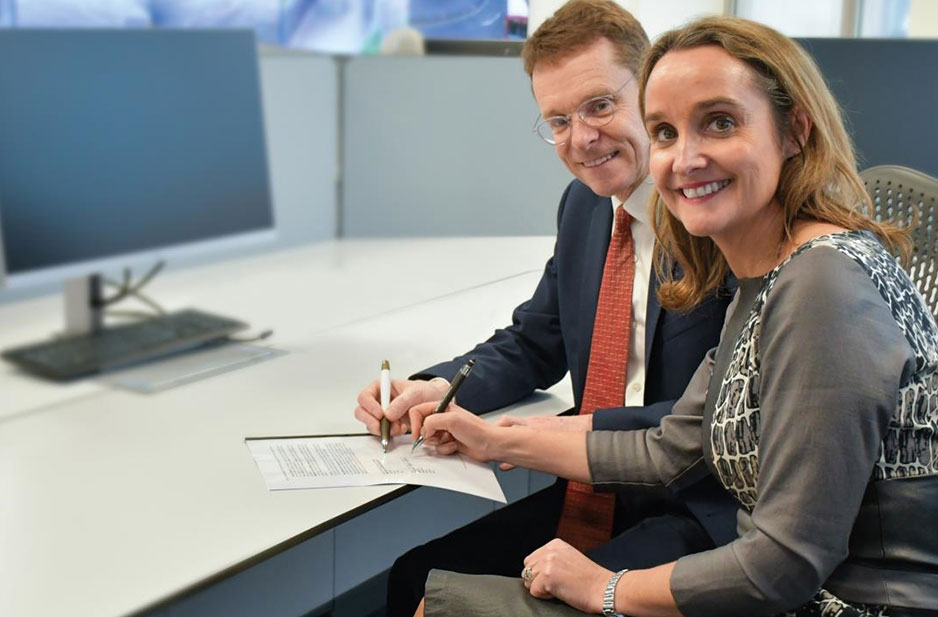Cars which find their own parking spaces and trams which report their own faults are just some of the futuristic transport systems being developed under a new agreement.
The Memorandum of Understanding (MOU) will see Transport for West Midlands (TfWM), West Midlands 5G (WM5G) and Vodafone work together to improve the way we travel around the region.
5G innovation will also play a key role in the region’s post coronavirus economic recovery plan, driving investment and delivering new jobs. The partnership is already in discussion regarding projects where 5G can potentially improve transport and support congestion and emissions reductions.
The agreement, signed by the Mayor of the West Midlands Andy Street on behalf of TfWM and Director of Vodafone Business Anne Sheehan, will see the partners share information and expertise and develop cutting-edge transport systems and technology using the region’s growing 5G mobile network.
Two 5G mobility projects already under development and led by WM5G are:
- The Kerbside Parking Availability Trial: The West Midlands is the first region in the UK to trial the concept of 5G-enabled identification of live kerbside parking availability. With the support of parking technology provider AppyWay, a series of trials took place in Sparkhill. The demonstration saw a live HD street scan being captured from a vehicle travelling an agreed section of roadway. The footage was transmitted and processed via 5G networks to confirm parking availability in real-time to the AppyParking app. By unlocking real-time availability parking data to drivers journey times, the flow of traffic and emissions levels can be improved. This will reduce congestion, improve air quality within urban environments, and make it more accessible for visitors to access our city centres and local highstreets.
- Connected tram trial: 5G is also proving to be an enabler on public transport. WM5G has been working with GoMedia – a leading infotainment provider – on some more practical solutions for the region’s tram network. By plugging CCTV systems into a 5G network, hi-resolution video footage can be monitored in real-time far more efficiently. In a world of social distancing, this can help transport operators determined the effectiveness of public safety measures on their services. Here 5G is enabling an intervention without the need for draconian measures to ensure public health and safety. The footage is captured and monitored at secure locations, protecting not only the safety of the network’s passengers but also their privacy. The same principles can be replicated outside of the carriage and at our stops and stations, enabling safeguarding at a safe, social distance and controlling the number of passengers.
Mayor of the West Midlands Andy Street said: “We have seen how vital good connectivity is during this pandemic, not only keeping many businesses going, but keeping friends and families connected.
“That is why I want the West Midlands to be at the forefront of 5G, using the technology to find new ways of working, travelling and staying connected. And when it comes to travel we are not just investing billions in rail, trams and bus technology, but, through our Future Transport Zone and 5G Testbed, we are looking to lead the way on developing the transport systems of the future.
“It’s exciting to think about what we can achieve in this area moving forward, and I am delighted we have been able to sign this new partnership with Vodafone.”
Director of Vodafone Business, Anne Sheehan, commented, “We’re hugely excited to be working on such innovative projects here in the West Midlands. We believe 5G has the potential to revolutionise transport. Its ultra-high bandwidth and low latency are perfect for real-time interactions that will underpin solutions to some of the biggest transport issues we face today, such as congestion and emission levels. It’s fantastic to be able to explore such solutions as part of the 5G Testbed and give the West Midlands the opportunity to become a global leader in this space.”
Cllr Ian Ward, Birmingham City Council leader and WMCA portfolio holder for transport said: “These projects show how we can harness cutting edge technology to make travel around the West Midlands easier, faster and more convenient. Whether it is improving safety on the Metro network or cutting the numbers of motorists circulating our cities searching for parking spaces.
“We are developing the next generation of transport systems through the Future Transport Zone and 5G testbed as we look to tackle the problems of climate change, pollution and traffic congestion and build our economy following the lockdown.”
TfWM, which is part of the West Midlands Combined Authority (WMCA), was awarded £22 million Future Transport Zone funding to work with universities and industry on exciting new technologies that can place the West Midlands at the heart of the next transport revolution.
West Midlands 5G Testbed has been set up by the Department for Culture, Media and Sport and WMCA to accelerate the deployment of 5G networks and to develop new 5G services across the region.
The MOU allows collaboration on systems which help improve air quality, reduce congestion, accelerate connected and autonomous vehicle technology, provide public health benefits and help the WMCA and TfWM achieve its aim of building a healthier, happier, better connected and more prosperous West Midlands.
